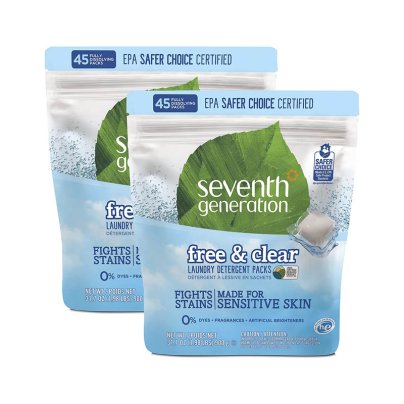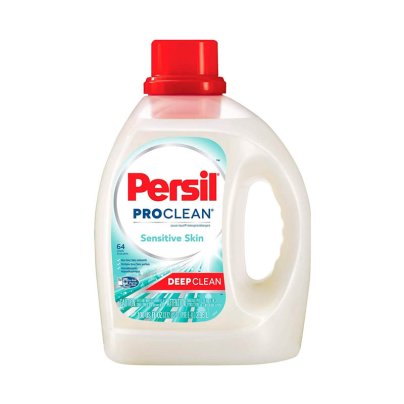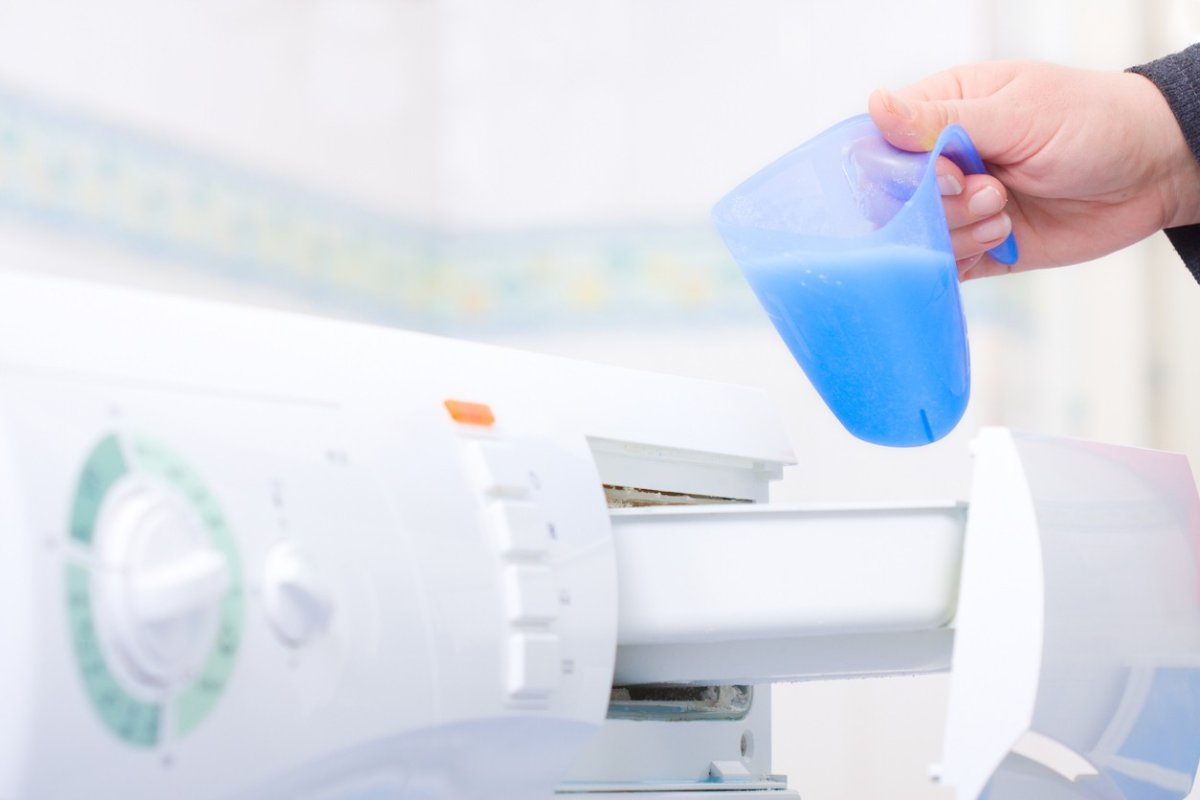
We may earn revenue from the products available on this page and participate in affiliate programs. Learn More ›
It’s easy to be overwhelmed by the selection of products claiming stain-removing, odor-busting, laundry-cleaning power. But which laundry detergents prove their mettle when tested against what’s in your laundry basket?
Detergents are more than just soap. They contain special ingredients that play a role in color fastness, stain removal, and deodorizing. Fortunately, you don’t need to skimp on quality to get an affordable, eco-friendly, and effective detergent that won’t harm your clothes, your health, or the planet.
Ahead, we’ll explore the different types of detergents on the market, dive into the factors you should weigh before buying, and highlight five of our top favorite picks among the best laundry detergent options available.
- BEST OVERALL: Seventh Generation Laundry Detergent Packs
- BEST LIQUID DETERGENT: Persil ProClean Sensitive Skin Laundry Detergent
- BEST POWDER DETERGENT: Molly’s Suds Original Laundry Detergent Powder
- BEST STAIN REMOVER: Tide PODS Free and Gentle Laundry Detergent
- MOST ECO-FRIENDLY: Tru Earth Eco-Strips Laundry Detergent
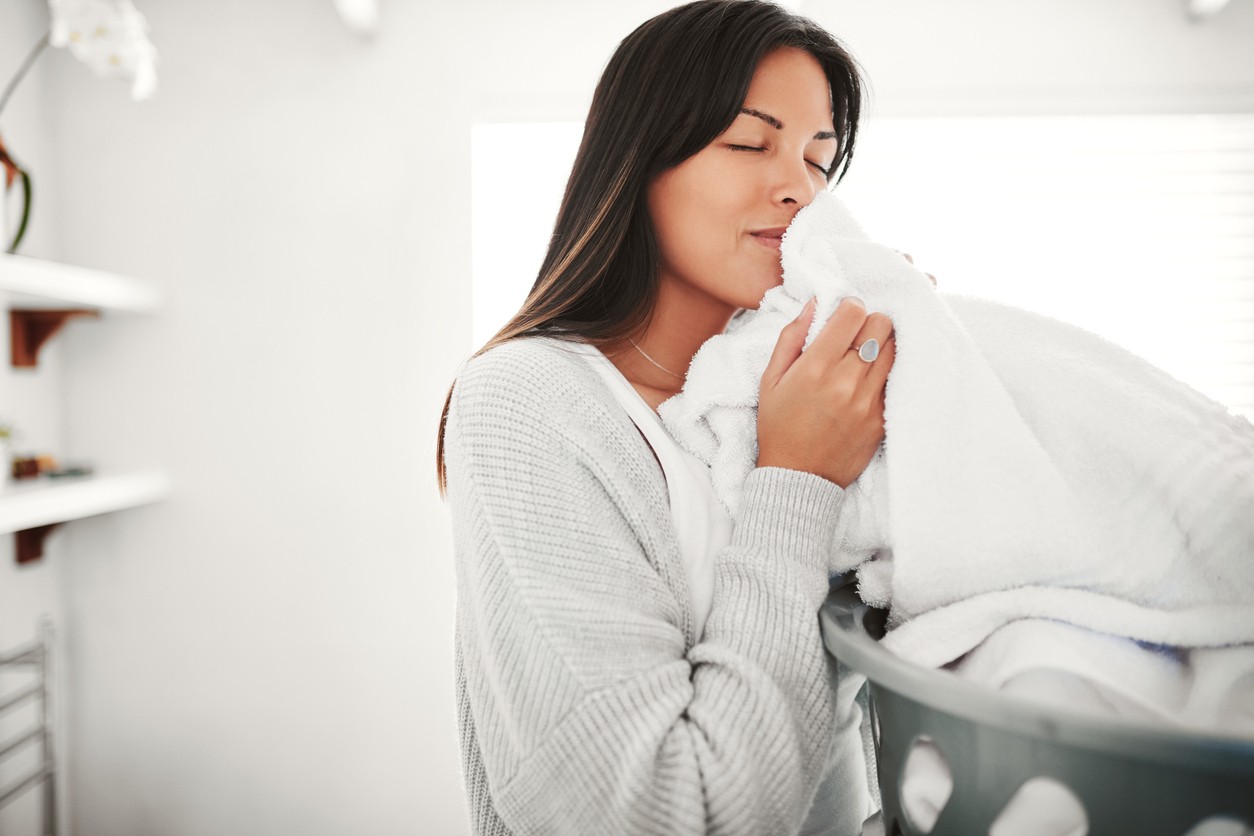
Types of Detergents
The first thing to decide is which type of detergent is right for your needs. You have four main options: liquid, powder, pods, and strips.
- Many people opt for liquid detergent because it’s readily available and versatile. Liquid detergent is great for pretreating stains, hand-washing delicates, and dissolving grease stains. It generally leaves less residue on clothes no matter what water temperature you choose. Liquid detergent is also safer for machines, in general, than powder. It dissolves thoroughly, making it less likely to clog your machine or septic system. On the downside, most liquids come in disposable, single-use plastic containers, which are harmful to the planet. Buying highly concentrated liquid detergent helps cut down on plastic waste, but an even better option is to choose products that sell refill packs or eliminate plastic containers.
- Powder detergent is a bit cheaper than liquid, approximately $70 less for an average of 300 loads per year. The active ingredients in powder detergent are also more effective at cutting through dirt—but less effective than liquid detergent at powering through grease stains. This is due to the active ingredients in both types of detergent. Alkylbenzene sulfonate, present in some powder detergents like Tide, scours mud, grass, and bloodstains from fabrics. The alcohol ethoxylates in liquid detergent like Persil are more suited to dissolving grease and oil stains. So if your family engages in lots of sports or outdoor activities, powder detergent may be the right choice for you.
- Pods are single-use detergent packets wrapped in water-soluble PVA (polyvinyl alcohol). Pods contain liquid detergent and are safe for use in most machines, including high-efficiency washers. Pods are growing in popularity because they ensure you don’t overdo the detergent. They also cut down on plastic waste, especially if packaged in heavy-duty cardboard. However, there are some safety risks. Since pods are brightly colored and small enough to swallow, be sure to keep them out of reach of kids and pets. This is true of all detergents, but especially so with the candy-like pods.
- Strips are the newest development in laundry detergent products. To seriously cut down on plastic waste and chemical toxicity associated with traditional laundry detergents, some brands like Tru Earth have developed laundry detergent strips. Made of polyvinyl alcohol, these strips are completely water-soluble and designed to replace liquid detergent, powder, and pods in both standard and high-efficiency machines. With nearly 70% plant-derived or biodegradable ingredients, these strips may be the wave of the future.
Key Shopping Considerations
Once you’ve decided on your formula type, there are a few additional points to consider. If you or a family member has sensitive skin or allergies, be especially aware of products containing fragrances and other additives that may be irritating. Fortunately, laundry brands are taking note and formulating products that are tough on stains but gentle on you.
Scented vs. Unscented
In general, artificial fragrances have a bad reputation. A study by the University of Washington back in 2008 found that top-selling laundry products emit dozens of toxic chemicals, some of which are hazardous but not listed on the product label. So buyer beware when it comes to scented laundry detergents especially. These products may contain phthalates, which are endocrine disruptors, as well as petrochemicals, which may have other health side effects. Look for products that state on the label that they contain no artificial fragrances. If you like scented detergent, find formulas that use natural compounds derived from essential oils and plants.
Stain-Busting Ingredients
Detergents also contain chemicals that remove stains, some of which may also impact human health and the environment. Here are the major additives to be aware of:
- Surfactants: These compounds break up and remove dirt and grease from laundry surfaces. One end of the surfactant molecule sticks to the surface of oily stains, while the other end attaches to water. This has the effect of pulling both the dirt and the surfactant molecule away from the surface, effectively cleaning fabrics and removing stains. Surfactants can be man-made or derived from natural substances like coconut and palm oil. Natural surfactants are growing in popularity for their greater sustainability and gentler impact on skin and clothes.
- Enzymes: Surfactants are not enough, however, to thoroughly clean and deodorize clothes and linens. Many detergents also contain enzymes, which are biological proteins that speed up chemical reactions. Enzymes help break down tough stains, and work in low temperatures and at fast speeds.
- Optical Brighteners: These synthetic chemicals can be added to laundry detergents to boost their whitening power. However, optical brightening agents (OBAs) don’t make clothes any cleaner. Rather, OBAs make clothes appear whiter by enhancing blue light emitted and minimizing yellow light. However, according to the Environmental Protection Agency, OBAs are possibly toxic to humans and also have negative effects on the environment. OBAs should be avoided, so look for detergents that state they are “free of optical brighteners.”
- Sodium Percarbonate: This white, granular powder is often paired with hydrogen peroxide in powdered detergents like Tide. When dissolved in water, sodium percarbonate frees hydrogen peroxide molecules and enhances its whitening capabilities. While it can be toxic or irritating to skin and eyes at high doses, typically this cleaning agent is considered safe for household use.
- Bleaching Agents: If you’re cleaning whites or tackling especially tough stains, you may want a detergent that contains a bleaching agent, like chlorine bleach or hydrogen peroxide. Chlorine bleach should only be used on whites, however, while hydrogen peroxide is also safe to use on colored fabrics. Use chlorine bleach sparingly, and only when stains require it since it can be harsh on machines, as well as irritating for sensitive skin.
HE Formulas
High-efficiency (HE) washing machines use much less water than conventional models. This is good news for water and energy conservation efforts. An ENERGY STAR-certified washing machine and dryer will help lower water and electricity bills for your household. If you already have an HE machine, you’ll want to make sure you purchase a compatible HE detergent. These low-sudsing formulas won’t clog up your washer with too many bubbles. Just look for the HE logo on the label, or read product specifications. Most detergents are switching to HE formulas, which still work with conventional machines.
Eco-Friendliness
It is super easy to find laundry detergents formulated with fewer artificial chemicals and more natural, plant-derived ingredients. To double-check whether a detergent is really as green as its label states, simply search for the product in the Environmental Working Group (EWG) Guide to Healthy Cleaning. This database lists ingredients and gives each product a grade for environmental friendliness.
Our Top Picks
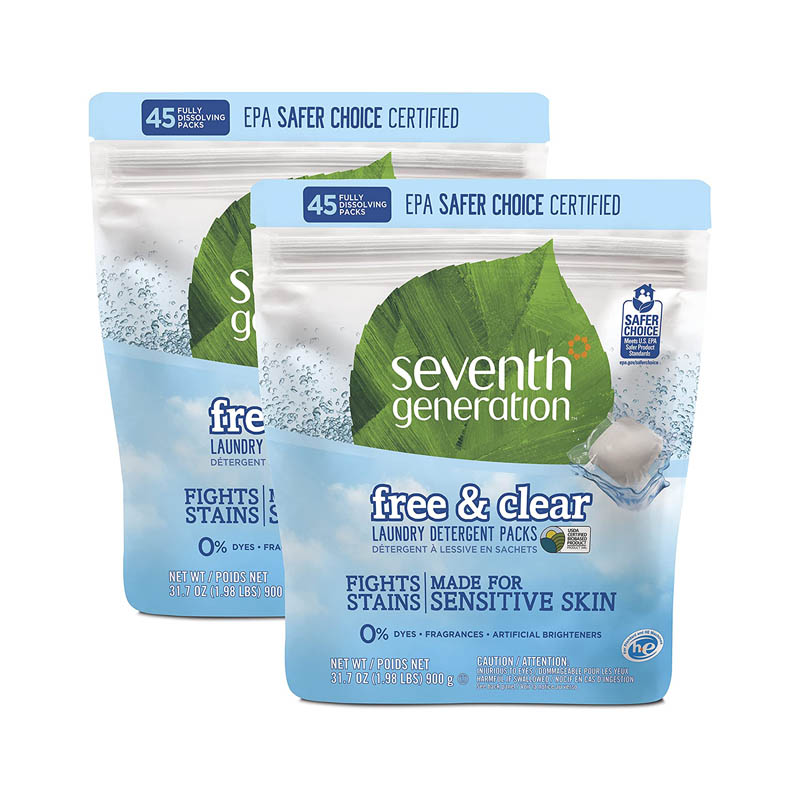
1. BEST OVERALL: Seventh Generation Laundry Detergent Packs
Eco-friendly and effective, Seventh Generation’s dirt-fighting detergent packs are backed up by the EPA’s Safer Choice certification, which guarantees the absence of fragrances, dyes, and artificial brighteners. In fact, this bio-based product consists of 94 percent plant-based ingredients. The powerful quadruple-enzyme formula tackles tough stains but won’t damage your clothes or irritate your skin. Plus, the fast-dissolving pods work in HE and standard machines.
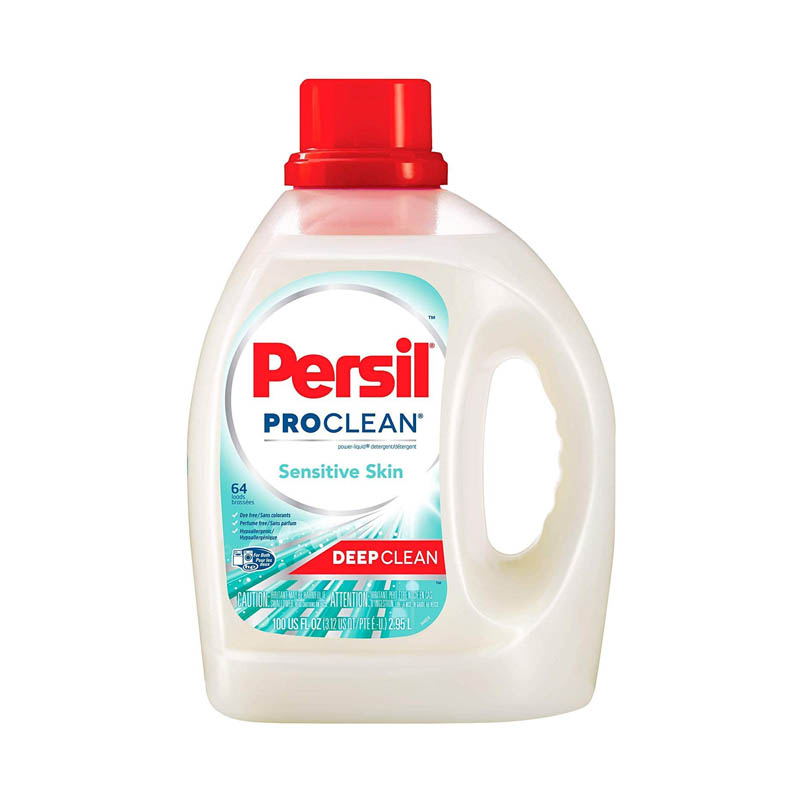
2. BEST LIQUID DETERGENT: Persil ProClean Sensitive Skin Laundry Detergent
A laundry detergent that’s specially formulated for sensitive skin, Persil’s ProClean Sensitive Skin Laundry Detergent is dermatologist tested, 100 percent hypoallergenic, and contains no irritants. Still, it’s formulated for heavy-duty use and can remove food particles, grass stains, grease, organic matter, and more. Use this Persil detergent in HE machines.
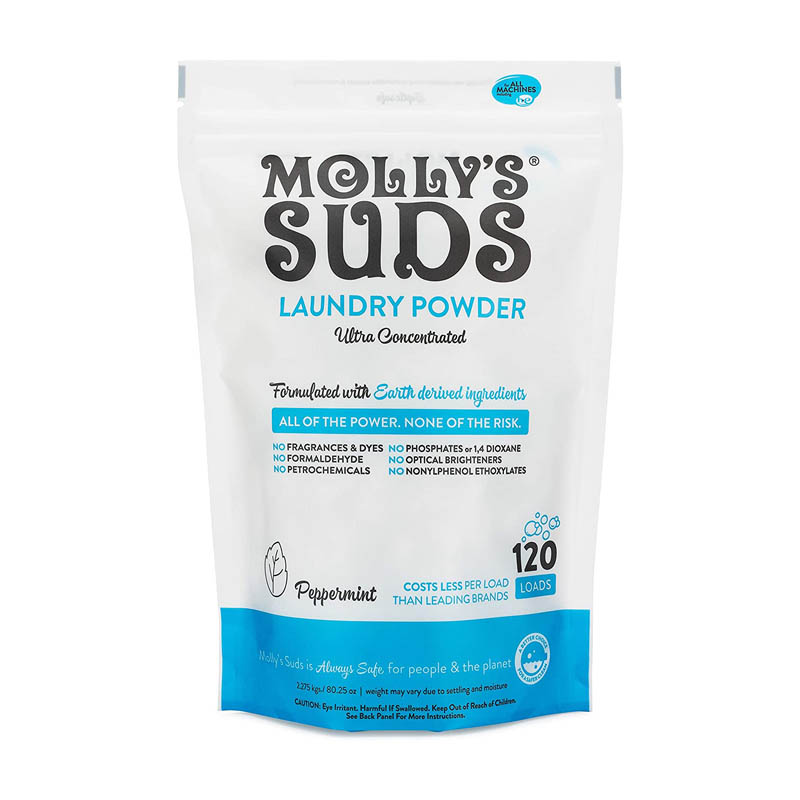
3. BEST POWDER DETERGENT: Molly’s Suds Original Laundry Detergent Powder
Go back to basics with one a healthy, green detergent. Molly’s Suds Original Laundry Detergent Powder is designed for people who are chemically sensitive, have allergies, or suffer from eczema. It is formulated with only five earth-derived ingredients and is safe enough for even your newborn infant’s clothing, diapers, and linens. Forget toxic chemicals including dyes, optical brighteners, petrochemicals, phosphates, bleach, and sulfates. Molly’s Suds is Certified Cruelty-Free, Certified Vegan, and rated A in the EWG Guide to Healthy Cleaning. Thanks to the low suds formula, this detergent can be used in both traditional and HE machines.
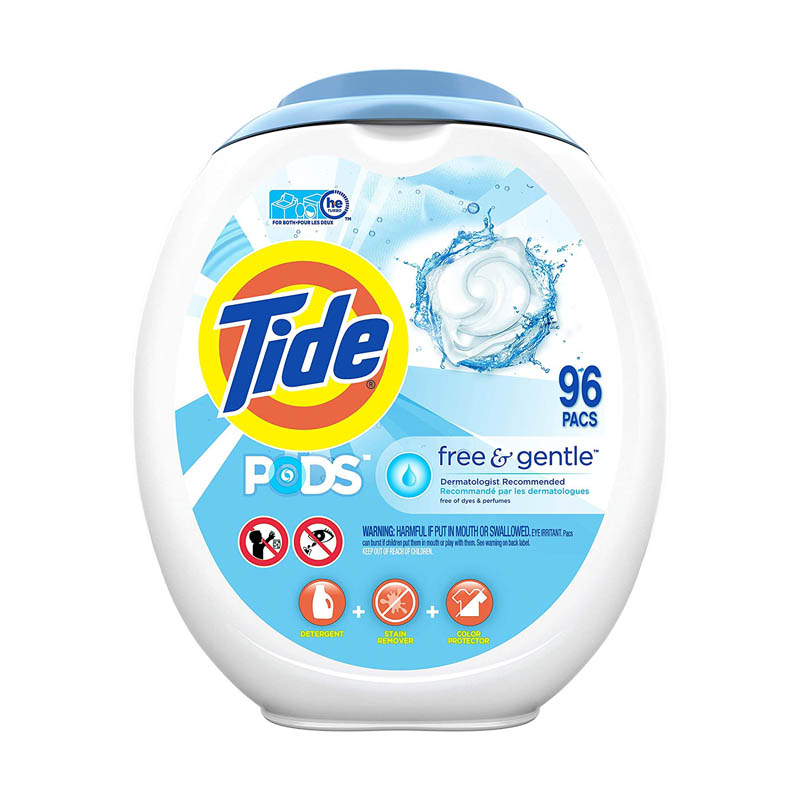
4. BEST STAIN REMOVER: Tide PODS Free and Gentle Laundry Detergent
Tide PODS are hypoallergenic, dermatologist tested, and free of dyes and perfumes. In fact, Tide PODS are the first and only detergent accepted by both the National Eczema Association and the National Psoriasis Foundation for irritant-free, pro-health laundry. The 3-in-1 technology marries a detergent, stain remover, and color protector, all in one tiny pod. Compatible with HE machines, the pods dissolve in both hot and cold water, providing a deep clean that’s gentle and effective.
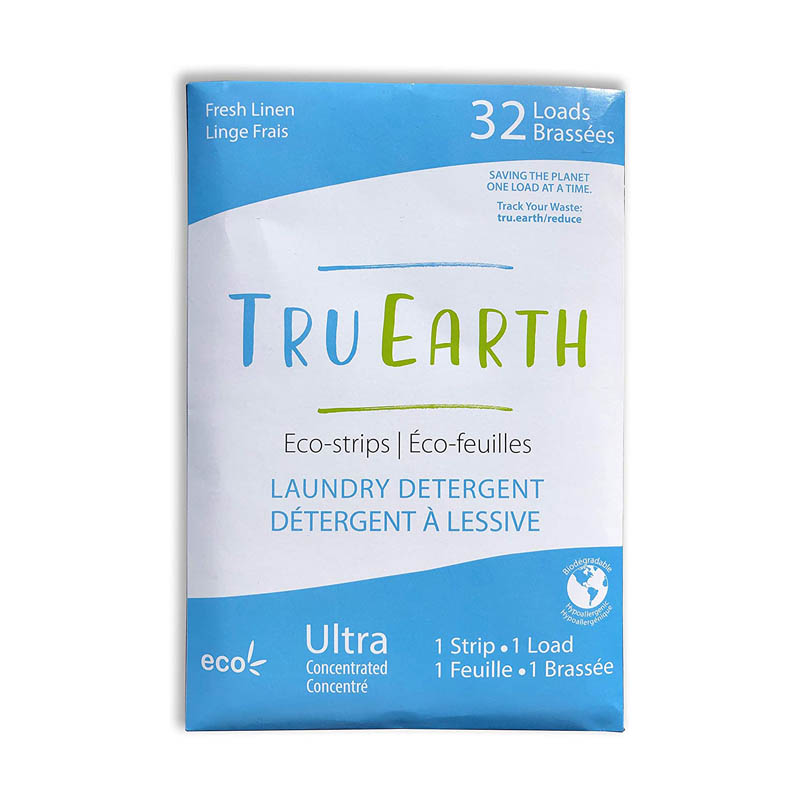
5. MOST ECO-FRIENDLY: Tru Earth Eco-Strips Laundry Detergent
If you’re eager to find a product that cuts down on waste, Tru Earth may be for you. These laundry strips are ultra-concentrated, hypoallergenic, and low sudsing—great for use in water-saving HE machines. The liquidless formula attracts and removes dirt and stains, without parabens or phosphates. Able to be used in all washing machines—HE units, front-loaders, and top-loaders—these no-mess, pre-measured strips are convenient both at home and while traveling.
